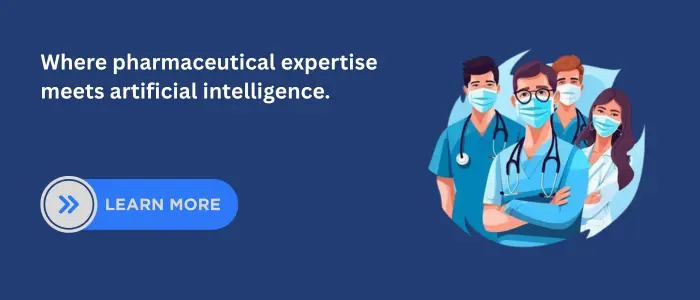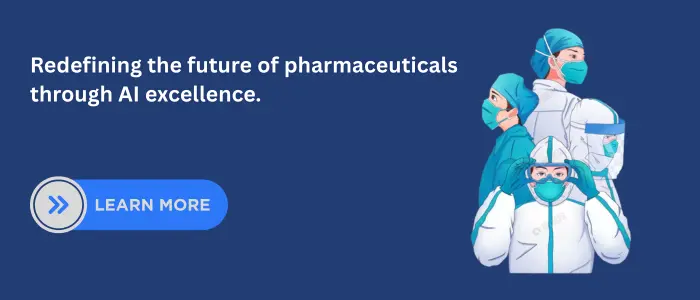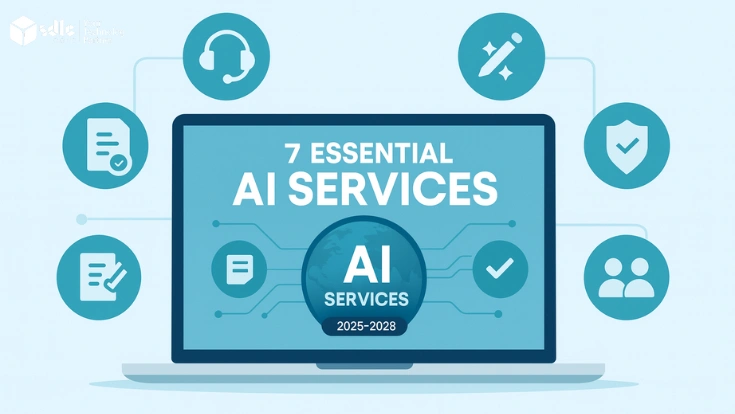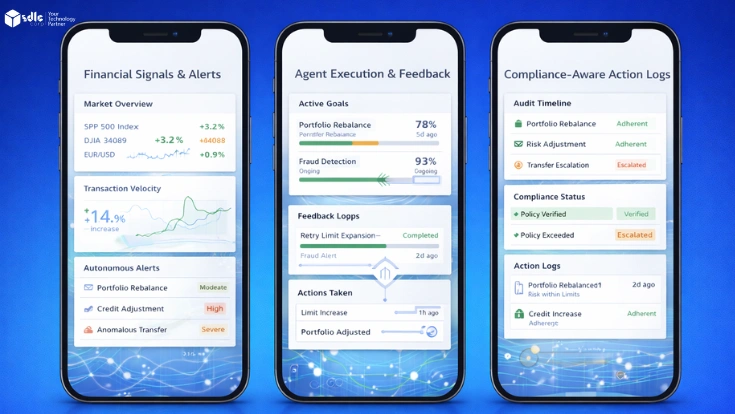Introduction
Artificial Intelligence (AI) is revolutionizing the pharmaceutical industry by reshaping how drugs are discovered, developed, tested, and brought to market. Unlike traditional methods that are slow and costly, AI-driven tools accelerate processes with higher precision and efficiency. From identifying new drug candidates to optimizing clinical trials, AI is enabling breakthroughs that were once unimaginable. Machine learning algorithms can analyze vast datasets in a fraction of the time, uncovering insights that help researchers target diseases more effectively.
The impact of AI extends across the entire drug lifecycle. It reduces development costs, shortens timelines, and improves the accuracy of predictions, ultimately bringing safer and more effective medicines to patients faster. A striking example of this transformation is the rise of generative AI. Recent studies suggest that generative AI alone could unlock between $60 billion and $110 billion annually for the pharmaceutical industry, underscoring its immense potential to drive innovation and profitability. This powerful combination of technology and medicine positions AI as one of the most important forces shaping the future of pharmaceuticals. To explore practical applications, check out our AI Development Services.
1. AI in Drug Discovery
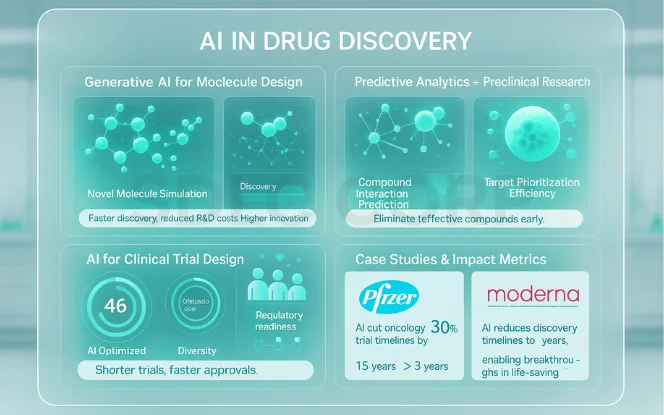
AI is revolutionizing pharmaceutical R&D by speeding up the identification of promising compounds and reducing the cost of drug development. Traditional drug discovery takes 10–15 years, but AI-powered platforms can cut timelines significantly by analyzing massive datasets in weeks rather than years.
Key Applications of AI in Drug Discovery
Generative AI for Molecule Design
Uses deep learning models to design novel drug-like molecules
Helps pharma companies explore millions of combinations rapidly
Example: Insilico Medicine discovered a fibrosis drug candidate in less than 18 months
Impact: Faster time-to-market, reduced R&D costs, higher innovation rates
Further Reading: Explore our guide on Generative AI for Healthtech .
Predictive Analytics in Preclinical Research
AI predicts how compounds interact with biological targets
Allows researchers to prioritize the most promising candidates
Impact: Saves time and resources by eliminating ineffective compounds early
AI for Clinical Trial Design
Machine learning analyzes patient data to optimize trial recruitment
Improves diversity and accuracy of trial results
Impact: Shortens trial duration and enhances regulatory approval chances
Case Study Highlight
- Pfizer used AI to analyze clinical trial data, cutting trial timelines by 30% for specific oncology studies.
- Moderna leveraged AI models during COVID-19 vaccine development, significantly accelerating mRNA design.
Key Takeaway
AI is reducing drug discovery timelines from decades to years, lowering costs, and enabling breakthroughs in life-saving therapies.
2. An Preclinical Research
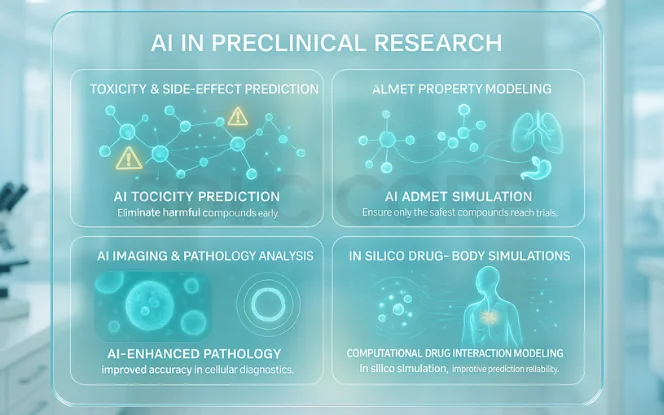
Preclinical research is a critical stage where potential drugs are tested for safety and biological activity before moving into human trials. Traditionally, this phase is resource-intensive and relies heavily on animal testing, which is both costly and ethically debated. AI is transforming preclinical research by offering faster, more accurate, and humane alternatives.
Applications of AI in Preclinical Research
- Toxicity & Side-Effect Prediction
Machine learning models analyze chemical structures and biological data to predict potential toxic effects before lab testing. This helps eliminate harmful compounds early in the pipeline. - ADMET Property Modeling
AI tools simulate Absorption, Distribution, Metabolism, Excretion, and Toxicity (ADMET) properties, ensuring only the safest compounds progress to trials. - AI-Powered Imaging & Pathology Analysis
AI-enhanced imaging systems detect subtle cellular changes and biomarkers in preclinical studies, improving accuracy in pathology assessments. - In Silico Simulations of Drug–Body Interactions
Computational models predict how drugs will interact with human biology, reducing reliance on animal testing while increasing prediction reliability.
Outcomes of AI-Driven Preclinical Research
- Safer compounds move forward to clinical trials.
- Reduced late-stage trial failures, saving billions in R&D costs.
- Significant reduction in animal testing, aligning with ethical and regulatory goals.
3. AI in Clinical Trials
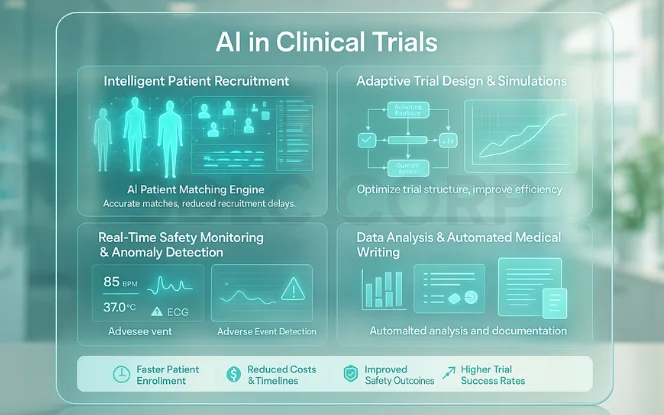
Clinical trials are among the most expensive and time-consuming phases of drug development. AI is revolutionizing this stage by optimizing patient recruitment, trial design, monitoring, and data management, making the process faster, safer, and more cost-effective.
Use Cases of AI in Clinical Trials
- Intelligent Patient Recruitment
AI analyzes electronic health records (EHRs) and uses natural language processing (NLP) to identify suitable participants. This ensures more accurate matches and reduces recruitment delays. - Adaptive Trial Design & Simulations
AI enables flexible trial designs that adjust based on interim results. Simulations help forecast outcomes, improving efficiency and reducing wasted resources. - Real-Time Safety Monitoring & Anomaly Detection
AI systems continuously monitor patient data to detect adverse events early. This proactive approach enhances patient safety and allows for quicker interventions. - Data Analysis & Automated Medical Writing
Machine learning algorithms process massive datasets from trials, uncovering patterns that humans might miss. AI also assists in generating regulatory reports and medical documentation, reducing manual effort.
Impact of AI in Clinical Trials
- Faster patient enrollment and trial initiation.
- Reduced operational costs and shorter timelines.
- Better safety outcomes through early risk detection.
- Higher probability of trial success by improving decision-making.
4. AI in Pharmaceutical Manufacturing (Pharma 4.0)
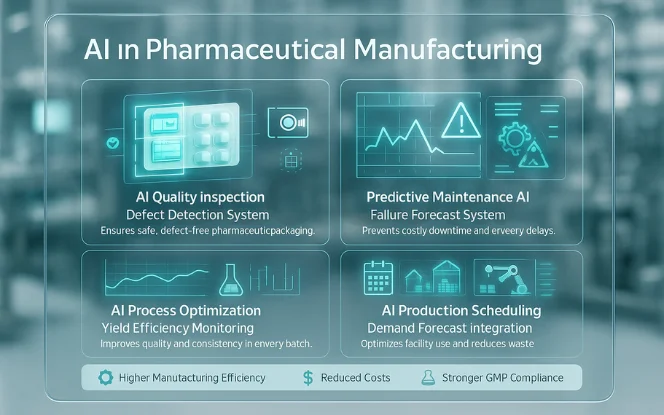
Pharmaceutical manufacturing is evolving into Pharma 4.0, where advanced technologies like AI, IoT, and automation integrate to create smarter, more efficient production systems. By leveraging real-time data and predictive models, AI is ensuring safer medicines, higher yields, and stronger compliance with regulatory standards.
Applications of AI in Manufacturing
- Computer Vision for Packaging & Quality Control
AI-powered vision systems detect defects in packaging, labeling, and dosage forms. This minimizes human error and reduces the risk of unsafe products reaching the market. - Predictive Maintenance on Production Machinery
Machine learning models analyze equipment performance data to predict failures before they occur. This prevents costly downtime and ensures uninterrupted production. - Real-Time Process Optimization & Yield Improvement
AI continuously monitors variables like temperature, pressure, and mixing speed to fine-tune production conditions, leading to higher yields and more consistent product quality. - Smart Scheduling for Production Campaigns
AI optimizes manufacturing schedules by analyzing demand forecasts, resource availability, and compliance requirements. This ensures efficient use of facilities while reducing waste.
Outcomes of AI in Pharma 4.0
- Improved manufacturing efficiency and reduced costs.
- Fewer product recalls thanks to early defect detection.
- Stronger compliance with Good Manufacturing Practices (GMP).
- Reliable delivery of safe, high-quality medicines.
5. AI in Regulatory Compliance & Pharmacovigilance
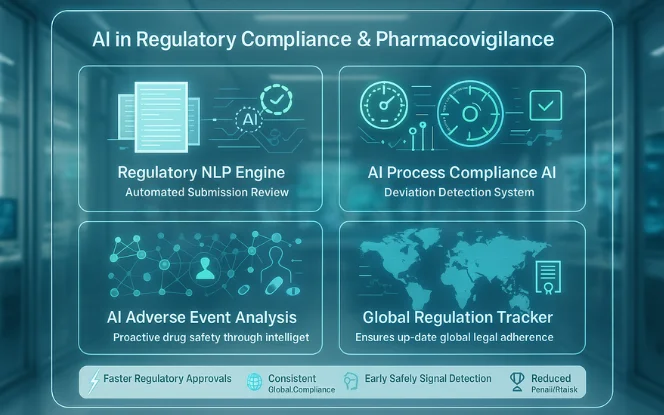
Regulatory compliance and pharmacovigilance are among the most complex and high-stakes areas of the pharmaceutical industry. Any delays, errors, or oversights can result in costly setbacks, recalls, or risks to patient safety. AI is helping pharmaceutical companies streamline compliance processes and strengthen drug safety monitoring, ensuring faster approvals and greater reliability.
Applications of AI in Compliance & Safety
- NLP for Regulatory Documentation & Submissions
Natural Language Processing (NLP) automates the preparation and review of large regulatory documents, reducing manual effort and minimizing human errors in submissions. - Continuous Monitoring of Processes for Deviations
AI systems track manufacturing and quality control processes in real time. Any deviations from compliance standards are flagged instantly, enabling quick corrective actions. - Pharmacovigilance: Detecting Adverse Event Patterns
AI analyzes patient data, social media, and medical reports to identify hidden patterns in adverse drug reactions. This proactive approach strengthens drug safety and reduces risks to patients. - Regulatory Intelligence (Tracking Global Changes)
AI platforms monitor evolving global regulations across multiple markets. This helps pharma companies stay updated and compliant with shifting legal frameworks.
Benefits of AI in Compliance & Pharmacovigilance
- Faster regulatory approvals through automated documentation.
- Consistent compliance with global standards.
- Earlier detection of safety signals and adverse drug reactions.
- Reduced risks of recalls, penalties, and reputational damage.
Beyond AI, integrated ERP platforms like Odoo for Pharmaceuticals also streamline compliance and documentation processes for the industry
6. AI in Supply Chain Management
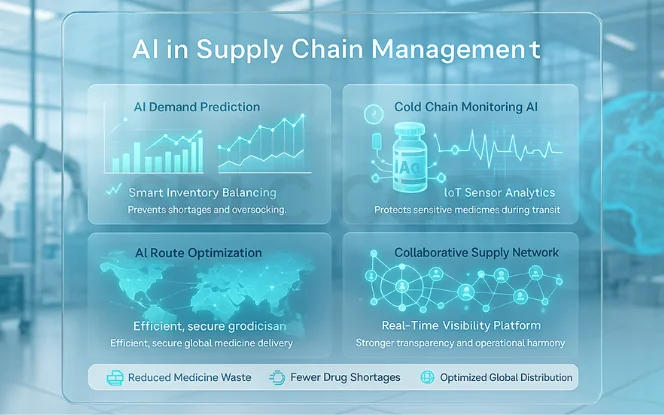
Pharmaceutical supply chains are highly complex, spanning global manufacturing sites, distribution hubs, and healthcare providers. Even small disruptions can lead to critical shortages of life-saving medicines. AI is strengthening supply chain resilience by enabling smarter forecasting, real-time monitoring, and predictive risk management.
Key Areas of AI in Supply Chain
- Demand Forecasting & Inventory Optimization
AI analyzes historical sales, market trends, and seasonal data to predict future demand with high accuracy. This prevents both overstocking and stockouts, ensuring medicines are available when needed.
- AI-Enabled Cold Chain Monitoring with IoT Sensors
Sensitive drugs like vaccines require strict temperature control. AI combined with IoT sensors monitors temperature and humidity in real time, preventing spoilage and ensuring compliance with safety standards.
- Logistics Route Optimization & Risk Prediction
AI evaluates traffic, weather, and geopolitical factors to determine the most efficient and secure delivery routes. It also predicts potential risks, allowing companies to plan contingency strategies. Similar applications are transforming other industries too. Explore how AI-Powered Supply Chain Optimization for Retail & E-commerce is reshaping global logistics and efficiency
- Inventory Management & Partner Collaboration
AI-powered platforms provide end-to-end visibility across the supply chain, enabling better collaboration between manufacturers, distributors, and healthcare providers.
Outcomes of AI in Pharma Supply Chain
- Reduced medicine waste through smarter demand planning.
- Fewer shortages of critical drugs.
- Optimized global distribution with lower operational costs.
- Stronger compliance and reliability in drug delivery.
7. AI in Marketing & Patient Engagement
Pharmaceutical marketing and patient engagement are shifting from broad, one-size-fits-all campaigns to personalized, data-driven strategies powered by AI. By combining predictive analytics, digital platforms, and real-time insights, AI enables pharma companies to connect more effectively with healthcare professionals (HCPs) and patients while maintaining compliance.
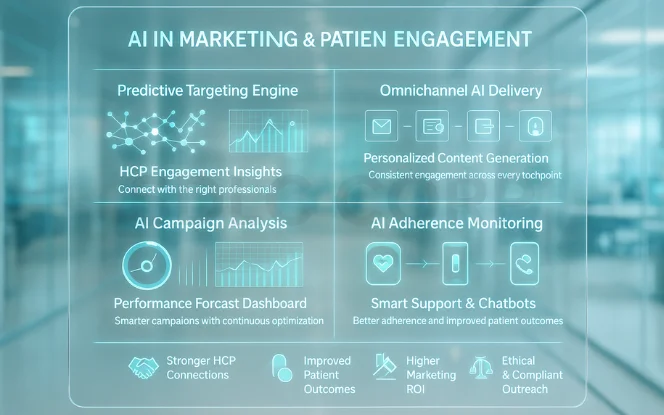
Applications of AI in Marketing & Engagement
- Precision Targeting of HCPs with Predictive Analytics
AI models analyze prescribing behavior, patient demographics, and market trends to identify the right healthcare professionals. This ensures more relevant outreach and stronger impact. - Personalized Content & Omnichannel Campaigns
AI tailors marketing content across email, social media, webinars, and in-person meetings. Omnichannel delivery ensures consistent and personalized engagement at every touchpoint. - Predictive Analytics for Campaign Optimization
Campaign performance data is continuously analyzed by AI to identify what works best. This helps optimize future campaigns, reducing wasted effort and maximizing ROI. - Patient Adherence Tracking via Apps, Wearables & AI Chatbots
AI-powered apps and devices remind patients to take medications, track adherence, and provide real-time support. Chatbots answer common queries, improving accessibility and reducing drop-off rates.
Impact of AI in Marketing & Patient Engagement
- Stronger connections with healthcare professionals.
- Improved patient adherence and long-term outcomes.
- Higher marketing ROI with data-driven campaigns.
- Ethical, compliant marketing aligned with regulations.
AI-driven personalization is not limited to healthcare industries like AI for Hospitality are also leveraging predictive insights to enhance customer experiences
8. Comparative Table: AI Across the Pharma Lifecycle
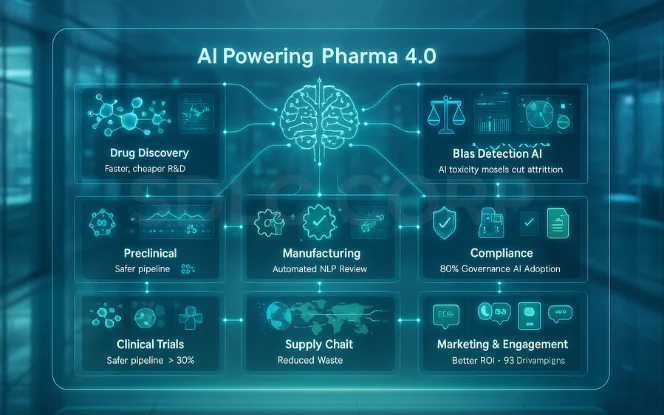
AI impacts every stage of the pharmaceutical value chain, from early discovery to marketing and patient engagement. The table below highlights key applications, benefits, and industry examples that showcase its transformative role.
| Stage | AI Applications | Key Benefit | Example |
|---|---|---|---|
| Drug Discovery | Generative models, repurposing | Faster, cheaper R&D | Insilico’s AI drug → Phase II |
| Preclinical Research | Toxicity prediction, ADMET models | Safer pipeline, fewer failures | AI toxicity models cut attrition |
| Clinical Trials | Recruitment, adaptive design, monitoring | Faster, safer trials | AI cut recruitment time by ~30% |
| Manufacturing | Vision QA, predictive maintenance | Efficiency, compliance | Pfizer AI label inspection |
| Compliance | NLP docs, pharmacovigilance | Faster approvals, fewer errors | 80% of pharma use AI in governance |
| Supply Chain | Demand forecasting, cold chain alerts | Reduced waste, resilience | 69% use AI for cold chain monitoring |
| Marketing & Engagement | HCP targeting, adherence tracking | Better ROI, improved outcomes | 93% of marketers use AI |
9. Challenges & Ethical Considerations in AI for Pharmaceuticals
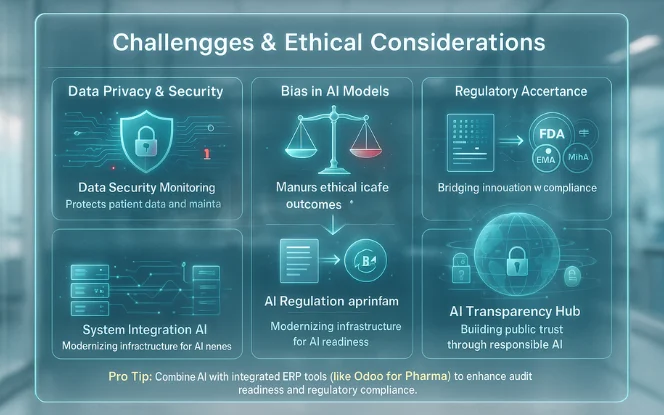
While AI offers tremendous opportunities, it also brings regulatory, ethical, and operational challenges that the pharmaceutical sector must address.
Data Privacy & Security
- Challenge: Clinical and patient data used for AI must remain secure and compliant with regulations like GDPR and HIPAA.
- Impact: Breaches can damage trust, slow adoption, and lead to heavy penalties.
Bias in AI Models
- Challenge: Algorithms trained on unbalanced datasets may produce biased results in drug trials or patient outcomes.
- Impact: Can compromise patient safety and reduce confidence in AI-driven insights.
Regulatory Acceptance
- Challenge: Global regulators are still evaluating frameworks for AI in drug discovery and clinical trials.
- Impact: Lack of standardized guidelines may delay approvals and market access.
- Pro Tip: For audit readiness, tools like 5 Key Odoo Apps Every Pharma Company Needs for Regulatory Audits can complement AI by ensuring compliance.
Integration with Legacy Systems
- Challenge: Many pharma companies run outdated IT systems that don’t easily connect with modern AI tools.
- Impact: Raises costs and slows implementation timelines.
Ethical Use of Patient Data
- Challenge: Transparency around how AI uses personal health data is critical for patient consent.
- Impact: Without clear ethical safeguards, public resistance could grow.
10. Future Trends in AI for Pharma
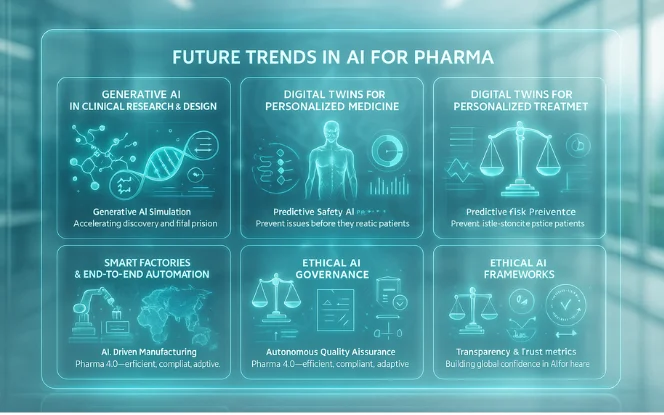
AI in pharmaceuticals is moving beyond early adoption into advanced, large-scale applications. The next decade will bring innovations that make drug development faster, more personalized, and more transparent, while ensuring ethical responsibility.
Key Future Trends
- Generative AI in Clinical Research & Drug Design
Beyond molecule discovery, generative AI will support clinical trial design, patient stratification, and real-time simulation of outcomes—drastically reducing time-to-market. To see how this extends across the healthcare sector, explore our article on Generative AI for Healthcare .
- Digital Twins for Personalized Medicine
AI-driven digital replicas of patients will allow researchers to simulate treatment responses before prescribing, enabling highly tailored therapies.
- AI-Enhanced Pharmacovigilance & Proactive Safety
Future pharmacovigilance systems will not only detect adverse events but also predict risks before they occur, improving patient safety worldwide. - Smart Factories & End-to-End Automation
Pharma 4.0 will expand with AI-powered factories that manage everything from raw materials to packaging, ensuring higher efficiency, compliance, and reduced human error. - Ethical AI Frameworks for Transparency & Trust
As AI adoption grows, industry-wide frameworks will emerge to ensure fairness, accountability, and explainability—building trust among regulators, healthcare providers, and patients.
Conclusion
Artificial Intelligence has become a game-changer across the entire pharmaceutical lifecycle, from early drug discovery to manufacturing, compliance, and patient engagement. Its applications are already proving that innovation and efficiency can coexist in this highly regulated industry. Adopting AI is no longer optional it is critical for pharmaceutical companies that want to remain competitive, accelerate innovation, and deliver medicines faster to patients in need.
Those who lag behind risk higher costs, slower development cycles, and reduced market relevance. Beyond efficiency, AI acts as a true force multiplier. It enables safer drugs, smarter trials, more resilient supply chains, and stronger patient connections. By embracing AI responsibly and ethically, the pharma industry can unlock new levels of trust, transparency, and impact. Ultimately, AI is not just transforming how medicines are made it is shaping a healthier future for patients worldwide. To explore tailored strategies and practical implementations, visit our AI consulting services.
FAQs
What is AI in pharmaceuticals?
AI applies machine learning and generative algorithms to biomedical and clinical data to accelerate drug discovery, optimize clinical trials, improve manufacturing, and enhance patient engagement.
How does AI speed up drug discovery?
AI virtually screens compounds, designs novel molecules, predicts ADMET/toxicity, and repurposes existing drugs reducing discovery timelines from years to months.
What are the benefits of AI in clinical trials?
AI improves patient recruitment, enables adaptive trial design, monitors safety signals in real time, and automates reporting making trials faster, safer, and more cost-efficient.
How is AI used in pharma manufacturing?
AI powers computer vision for quality control, predictive maintenance for equipment, real-time process optimization, and digital twins — ensuring compliance, efficiency, and reduced costs.
What are the main challenges of AI in pharma?
Key challenges include data quality, model bias, legacy system integration, regulatory acceptance, data privacy/security, and the need for specialized AI talent.
Does AI enable precision medicine?
Yes. AI integrates genomic, imaging, and clinical data to stratify patients, predict treatment response, and design biomarker-driven trials for personalized therapies.

